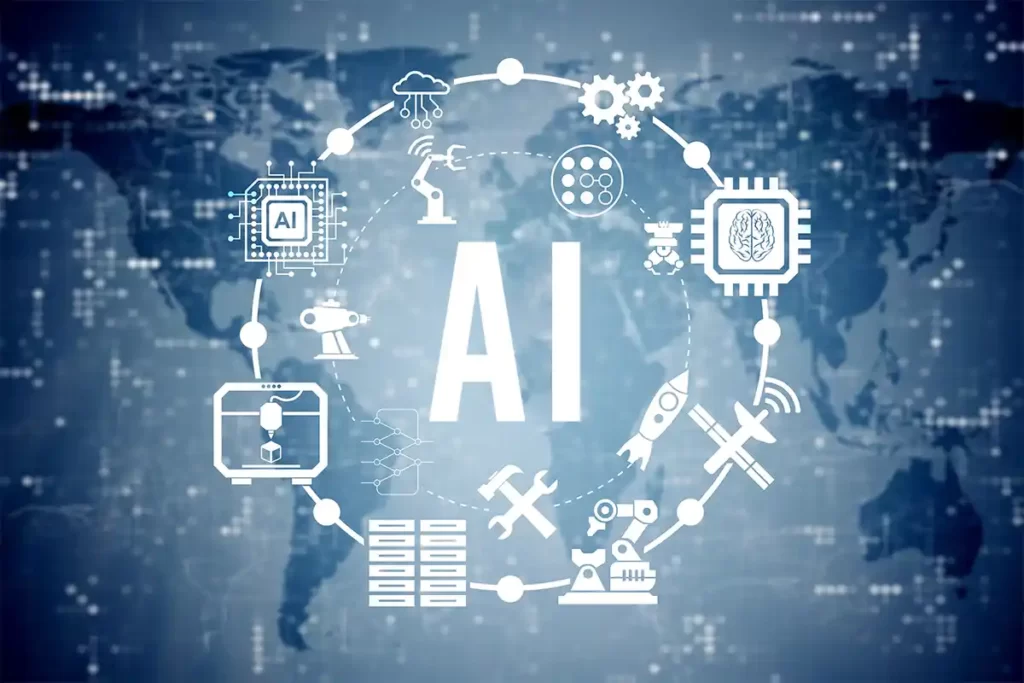Artificial Intelligence (AI) is transforming the way we live and work. It refers to the ability of a computer or machine to mimic human intelligence and behaviors, such as learning and problem-solving. In this article, we will explore the various ways in which AI is being used in different industries and its potential impact on our lives.

Boosting Efficiency and Productivity with Automation
The application of AI in automation can significantly boost efficiency and productivity across various industries. By automating tasks, machines with AI can perform them more quickly and accurately than humans, freeing up time and resources for businesses to focus on other critical tasks.
For instance, AI in manufacturing can help streamline production processes, monitor quality control, and identify defects more quickly and accurately than humans. In logistics, AI can help optimize supply chain management and reduce transportation costs through predictive analytics and route optimization.
In finance, AI can assist with tasks such as fraud detection, risk management, and investment analysis by analyzing large amounts of data in real time. AI can also be used to automate routine tasks such as data entry and processing, freeing up human resources for more complex tasks.
Overall, AI in automation can help businesses improve operational efficiency, reduce costs, and enhance the quality of products and services. As AI technology continues to advance, we can expect to see more innovative uses of automation in various industries.
Enhancing Customer Service with AI
AI is being increasingly utilized to improve response times and provide efficient support to customers. AI-powered chatbots, for instance, are designed to interact with customers via text or voice and provide accurate and relevant responses to their queries.
These chatbots use natural language processing and machine learning algorithms to understand the context of customer inquiries and provide personalized responses. They can also route customer inquiries to the appropriate channels or teams for resolution, without any human intervention.
AI in customer service can also help with sentiment analysis, which involves analyzing customer feedback and social media interactions to identify patterns and provide insights for businesses to improve their customer support strategies.
Revolutionizing Healthcare with AI
In the healthcare industry, AI is being used to analyze medical data and assist with diagnosis and treatment plans. It can also be used to monitor patients remotely and alert healthcare providers to potential issues.
Improving Decision-Making in Finance with AI
AI is also being utilized in the financial industry for tasks such as fraud detection and investment analysis. It can analyze large amounts of data quickly and accurately, which can save time and improve decision-making.
Personalizing Education with AI
In the field of education, AI is being used to personalize learning experiences for students. It can assess a student’s abilities and learning style and create a customized curriculum accordingly. AI is also being used to grade assignments and provide feedback to students.
Benefits and Concerns of AI
Benefits:
- Increased efficiency and productivity: Machines with AI can perform tasks more quickly and accurately than humans, which can improve efficiency and productivity.
- Better decision-making: AI can process and analyze large amounts of data quickly and accurately, leading to better decision-making.
- Personalization: AI can personalize experiences for customers, patients, and students based on their individual preferences and needs.
- Cost savings: By automating routine tasks and processes, AI can save businesses time and money.
- Improved safety: AI can be used in dangerous or hazardous environments, reducing the risk of harm to human workers.
- Innovation: AI can be used to develop new products and services, leading to new opportunities and economic growth.
Concerns:
- Job displacement: As AI takes over certain tasks and processes, there is a risk of job displacement for human workers.
- Bias and discrimination: AI can perpetuate bias and discrimination if the data used to train the algorithms is biased or the algorithms are not designed to be unbiased.
- Privacy and security: The use of AI can pose a risk to privacy and security if data is mishandled or misused.
- Dependence on technology: Overreliance on AI can result in a loss of critical skills and knowledge among human workers.
- Ethical considerations: There are ethical concerns surrounding the use of AI, particularly with regard to decision-making and accountability.
As with any technology, it is important to balance the benefits of AI with the potential risks and concerns. Ongoing research, development, and responsible use of AI can help to maximize its benefits while minimizing its risks.
Also Read: The Future of Virtual Reality: An In-Depth Exploration of a Revolutionary Technology
Thank you for visiting Animaders! If you enjoyed this content, please consider liking and subscribing to our website for more amazing content. Your support helps us create even more great content and keep Animaders growing. Thanks again!


















